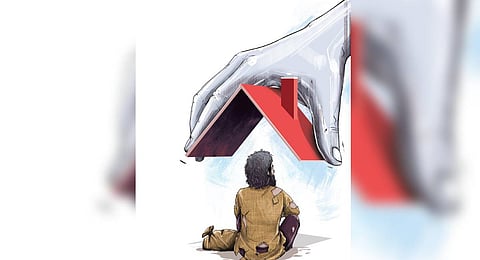

CHENNAI: Chief Minister MK Stalin on Thursday released the state policy for Care of Homeless Persons with Mental Illness and Implementation Framework – 2024, brought out by the Health and Family Welfare Department, as part of the government’s commitment to delivering quality services to this vulnerable segment of society.
The proposed policy framework delineates the service provided to Homeless Persons with Mental Illness (HPWMI) into four stages -- rescue and acute care, intermediary care, long term care, and social integration.
The policy proposes a standard operating procedure (SOP) to be followed in rescue operations. When a rescuer finds any person to be homeless and suspects mental illness, he shall inform the nearest police station and assist the cops in rescue operation.
The police with or without the assistance of NGOs should take the person concerned to a government medical college hospital or headquarters hospital for admission. Medical assessment should be done. The medical officer in-charge shall arrange for assessment of mental health.
The policy states that if the person doesn’t have mental illness, then the psychiatrist should inform the police for reunion with the family, or if the person has mental illness and is severely ill, he/she should be treated at the medical college hospital itself.
The policy also details what should be done if the person is below 18 years, woman or pregnant and a victim of crime.
The HPWMI after discharge from acute psychiatric care shall be transferred to Emergency Care and Response Centre (ECRC) for intermediary care. The duration of the stay should be 12 months or until union with the family, whichever is earlier.
The policy also lists the facilities that should be provided in the ECRCs. The inmates should be provided with social welfare benefits like Aadhaar, Chief Minister Comprehensive Health Insurance Scheme cards, Unique Disability ID (UDID), family card and access to public distribution system (PDS).
They should also be provided access to disability benefits, banking support and other welfare schemes available under different government departments. They should be provided access to livelihood through jobs.
In the long term care and social integration, when the inmate cannot be reunited with the family, they should be transferred to halfway homes to encourage independent living through community integration.
The rehabilitation programme for inmates should include social skill development, basic home management, pre-employment preparation, tracking of health and follow-up treatment. Employment opportunities also should be facilitated through skill assessment, job placement assistance, and encouragement of entrepreneurship, the policy states.
Policy highlights
Policy defines a homeless person with mental illness as any person with mental illness found wandering in public places without family, abandoned by family, or unable to be taken care of by family
Chief executive officer of State Mental Health Authority (SMHA) shall be the nodal authority for empanelling NGOs involved in rescue operations
102 will be the designated helpline number for the rescue of homeless persons with mental illness
Policy stresses the need for comprehensive research on clinical, epidemiological and operational aspects of homeless individuals with mental illness